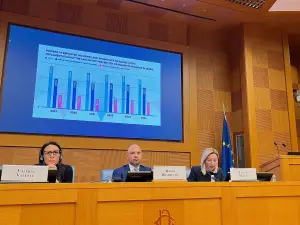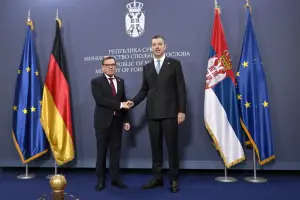- Serbia
Get to know Serbia
- Citizens
Culture and science
Health services
Pension and disability insurance
- Business
Employment
Economy
- Media
- Government
- Contact
Keep in touch
Contact form
Back
Keepin touch
Whether you have a question, comment, suggestion or any problem in the purview of the government, send us your message and we will try to respond as soon as possible. If your problem is not in our purview, we will forward your message to the relevant institution.
Q:
A:
World AIDS Day 2004 observed
Belgrade,
1 December 2004
Between 1989 and late 2003, a total of 1,897 persons living with the HIV virus have been registered in Serbia, 1,188 of whom have been diagnosed with AIDS. 845 people have died from the disease during that time. However, it is estimated that the number of those infected is much higher. Assistant Minister of Health Aleksandar Zivanovic said that the adoption of a national strategy is the first precondition in the systematic fight against HIV.
Zivanovic told B92 radio television that the price of treatment for HIV patients in the next year will be reduced by 20 to 25 percent, and that approximately €5 million to 6 million will be set aside in assistance to HIV patients.
In 2004, 75 newly infected persons have been registered in Serbia, 55 of whom in Belgrade, 10 in Vojvodina and 10 in the rest of Serbia. Out of the total number, 64 percent are between the ages 30 to 49, whereas only 5 percent of infected in the population aged 15 to 24.
Among the newly infected, there are 57 men and 16 women. With two-thirds of the infections coming through sexual intercourse, additional importance should be placed on condom-use as the most effective protection against AIDS transmission.
Due to a large increase in the number of women infected with AIDS, this year's campaign is aimed at women and girls, and is titled "Have you heard us today?"
According to data by UNAID, in the world there are 39.4 million people infected with HIV, with 3.1 million dieing of the disease in 2004 alone.
In 2004, there were 4.9 million new infections; 4.3 million of those were in adults and 640,000 in children.
Gordana Jurican, from the Yugoslav Association for the Fight Against AIDS (JAZAS), said that practice has shown that one of the greatest problems in the treatment of those infected is that virus carriers get tested too late, after the disease has become fully developed and when it is almost impossible for any treatment. For that reason, JAZAS, in cooperation with many state bodies, UN and NGO agencies, has launched campaigns encouraging condom use.
According to Jurican, 62 percent of the new infections reported were from sexual intercourse. She further point out that the young in Serbia-Montenegro are aware of AIDS and the ways of its transmission, but do not act in line with that knowledge. Jurican noted that the country of Serbia-Montenegro ranked near the bottom in terms of the number of people tested for AIDS as well.
In 2004, 75 newly infected persons have been registered in Serbia, 55 of whom in Belgrade, 10 in Vojvodina and 10 in the rest of Serbia. Out of the total number, 64 percent are between the ages 30 to 49, whereas only 5 percent of infected in the population aged 15 to 24.
Among the newly infected, there are 57 men and 16 women. With two-thirds of the infections coming through sexual intercourse, additional importance should be placed on condom-use as the most effective protection against AIDS transmission.
Due to a large increase in the number of women infected with AIDS, this year's campaign is aimed at women and girls, and is titled "Have you heard us today?"
According to data by UNAID, in the world there are 39.4 million people infected with HIV, with 3.1 million dieing of the disease in 2004 alone.
In 2004, there were 4.9 million new infections; 4.3 million of those were in adults and 640,000 in children.
Gordana Jurican, from the Yugoslav Association for the Fight Against AIDS (JAZAS), said that practice has shown that one of the greatest problems in the treatment of those infected is that virus carriers get tested too late, after the disease has become fully developed and when it is almost impossible for any treatment. For that reason, JAZAS, in cooperation with many state bodies, UN and NGO agencies, has launched campaigns encouraging condom use.
According to Jurican, 62 percent of the new infections reported were from sexual intercourse. She further point out that the young in Serbia-Montenegro are aware of AIDS and the ways of its transmission, but do not act in line with that knowledge. Jurican noted that the country of Serbia-Montenegro ranked near the bottom in terms of the number of people tested for AIDS as well.
-
 Belgrade, 21 November 2025
Belgrade, 21 November 2025Joint commitment to strengthen bilateral ties between Serbia, Botswana
-
 Belgrade/Rome, 21 November 2025
Belgrade/Rome, 21 November 2025Serbian government’s strong commitment to combating violence against women
-
 Belgrade, 18 November 2025
Belgrade, 18 November 2025Serbia remains committed to open dialogue, cooperation with OSCE
-
 Belgrade, 18 November 2025
Belgrade, 18 November 2025Cooperation with WHO to strengthen protection for victims of violence
-
 Belgrade, 18 November 2025
Belgrade, 18 November 2025Germany ready to accompany Serbia on its path towards EU
-
 Belgrade, 16 November 2025
Belgrade, 16 November 2025Solution for NIS must be found by next week
-
 Belgrade, 15 November 2025
Belgrade, 15 November 2025United States sends request for Russian ownership to exit NIS
-
 Belgrade, 13 November 2025
Belgrade, 13 November 2025Serbia continues to be reliable partner of EU
-
 Belgrade, 13 November 2025
Belgrade, 13 November 2025European integration, preserving peace, stability priorities for Serbia
-
 Belgrade, 13 November 2025
Belgrade, 13 November 2025Cooperation agreement signed for preparation of Specialised Expo 2027
